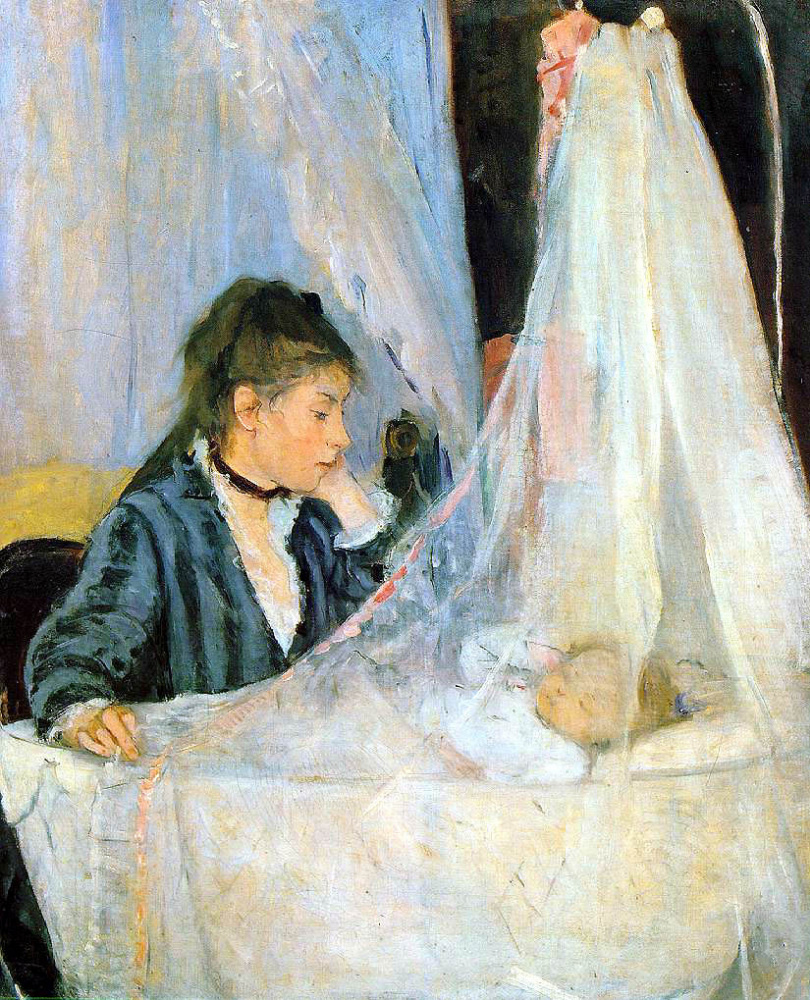log in
Enter site
Login to use Arthive functionality to the maximum
At the cradle
Berthe Morisot • Painting, 1872, 56×46 cm
Description of the artwork «At the cradle»
French society of the second half of the XIX century was the most portrayed in the history of painting. It seems that in every corner of Paris, from from the Opera house and ending with the bedroom French women – daily sat to the artist and kept a chronicle of the life of his contemporaries. Without Berthe Morisot this chronicle would be incomplete.
Ballerina, prostitutes, laundresses, workers, frequenters of bars and dance floors, bathers, merchants occupied the thoughts and paintings of her friends of male artists. They went to other countries and conquer the elements, to find new images. They went to war and wound up violent novels to find inspiration. And Berte Morisot was enough to observe what her family and friends. And the nearer and dearer the person, the deeper you can penetrate into its essence, and the more inspired mimoletnosti he can give for a new picture. Writing for Berthe Morisot – part of daily life as breathing or sleeping.
The heroes of the most famous paintings of the artist "At the cradle" her sister Edma and newborn daughter of Admi Blanche. Sister Bertha has always remained a special bond they have for many years worked in one workshop, breathing the same air and were inspired by the same subjects. And dreamed to devote his entire life to painting. For Admi dreams remained dreams – she got married and stopped writing, but the scenes of her family life were the most delicate, light and nagging in the works of her sister Bertha.
The painting "the cradle" was presented to the public at the first impressionist exhibition held in 1874 and became a challenge to the academic Salon. And Berthe Morisot was the only woman of the 30 artists who dared to throw the challenge. Because of the traditional plot and explosive neighbours that the cloth remained virtually unnoticed by critics and until 1930 was owned by the family of Edme Portion. Along with other paintings from the heirs gave this painting as a gift to the Louvre, where it moved to the musée d'orsay.
Author: Anna Sidelnikova
Ballerina, prostitutes, laundresses, workers, frequenters of bars and dance floors, bathers, merchants occupied the thoughts and paintings of her friends of male artists. They went to other countries and conquer the elements, to find new images. They went to war and wound up violent novels to find inspiration. And Berte Morisot was enough to observe what her family and friends. And the nearer and dearer the person, the deeper you can penetrate into its essence, and the more inspired mimoletnosti he can give for a new picture. Writing for Berthe Morisot – part of daily life as breathing or sleeping.
The heroes of the most famous paintings of the artist "At the cradle" her sister Edma and newborn daughter of Admi Blanche. Sister Bertha has always remained a special bond they have for many years worked in one workshop, breathing the same air and were inspired by the same subjects. And dreamed to devote his entire life to painting. For Admi dreams remained dreams – she got married and stopped writing, but the scenes of her family life were the most delicate, light and nagging in the works of her sister Bertha.
The painting "the cradle" was presented to the public at the first impressionist exhibition held in 1874 and became a challenge to the academic Salon. And Berthe Morisot was the only woman of the 30 artists who dared to throw the challenge. Because of the traditional plot and explosive neighbours that the cloth remained virtually unnoticed by critics and until 1930 was owned by the family of Edme Portion. Along with other paintings from the heirs gave this painting as a gift to the Louvre, where it moved to the musée d'orsay.
Author: Anna Sidelnikova



